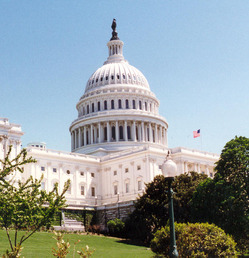What's Congress doing in response to BP's oil disaster?
 Environmental advocates were handed a big disappointment last week with the death of carbon cap-and-trade legislation in the U.S. Senate -- a measure that would have been a step toward ending the externalization of some costs associated with pollution from oil and other fossil fuel energy sources.
Environmental advocates were handed a big disappointment last week with the death of carbon cap-and-trade legislation in the U.S. Senate -- a measure that would have been a step toward ending the externalization of some costs associated with pollution from oil and other fossil fuel energy sources.As Grist's David Roberts reported, Majority Leader Harry Reid (D-Nev.) basically canvassed his caucus and figured out what could be paid for without putting a price tag on carbon, as well as what already had the backing of a 60-vote super-majority that's now de rigueur for getting anything done in the Senate.
But if there's any silver lining to this dark cloud over the environmental agenda, it's that Reid has promised to move ahead with some form of clean-energy legislation -- and he's said that among other things "it must deal with the catastrophe in the Gulf."
It's certainly time for federal lawmakers to update oversight of offshore drilling, as it's been 32 years since Congress last amended relevant laws overseeing the business. Since then there have been significant advances in drilling technology that have allowed companies to extract oil and gas from deeper and more remote waters, dramatically increasing the risk to coastal communities and ecosystems.
A number of bills are now moving through the House and Senate with provisions aimed at reforming the federal regulatory system for offshore drilling. Among them:
* Big Oil Bailout Prevention Liability Act (S. 3305) would retroactively eliminate the cap on financial liability for an offshore oil spill while requiring better spill response plans.
* Outer Continental Shelf Reform Act (S. 3516) would disqualify from bidding any operators with bad track records.
* Gulf of Mexico Restoration and Protection Act (S. 1311) establishes a Gulf of Mexico program office within the Environmental Protection Agency to better protect the region's ecosystems.
* Blowout Prevention Act (H.R. 5626) bans the drilling of high-risk wells without written certification that the companies have equipment to prevent a blowout.
The Pew Environment Group at the Pew Charitable Trusts has analyzed oil disaster-related legislation that passed out of a House or Senate committee and/or out of the House as of July 22. To read Pew's fact sheet summarizing details of that legislation, click here.
Tags
Sue Sturgis
Sue is the former editorial director of Facing South and the Institute for Southern Studies.
